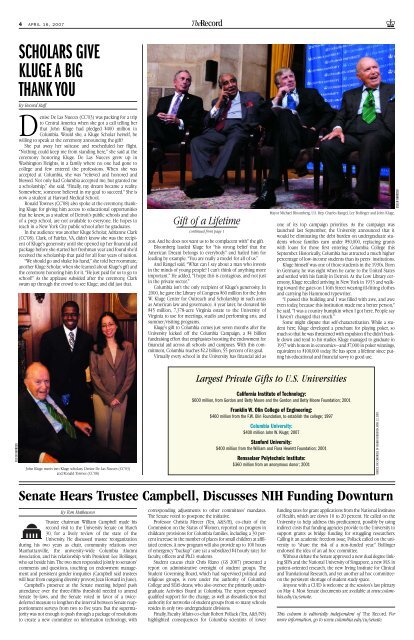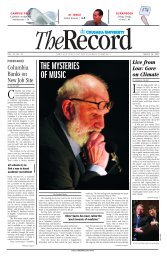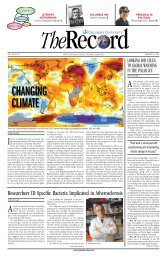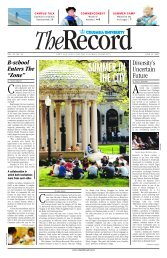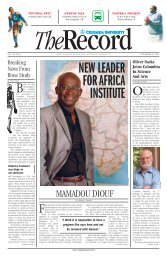April 16, 2007 - Columbia News - Columbia University
April 16, 2007 - Columbia News - Columbia University
April 16, 2007 - Columbia News - Columbia University
- No tags were found...
Create successful ePaper yourself
Turn your PDF publications into a flip-book with our unique Google optimized e-Paper software.
4APRIL <strong>16</strong>, <strong>2007</strong>TheRecordSCHOLARS GIVEKLUGE A BIGTHANK YOUBy Record StaffDenise De Las Nueces (CC’03) was packing for a tripto Central America when she got a call telling herthat John Kluge had pledged $400 million to<strong>Columbia</strong>. Would she, a Kluge Scholar herself, bewilling to speak at the ceremony announcing the gift?She put away her suitcase and rescheduled her flight.“Nothing could keep me from standing here,” she said at theceremony honoring Kluge. De Las Nueces grew up inWashington Heights, in a family where no one had gone tocollege and few entered the professions. When she wasaccepted at <strong>Columbia</strong>, she was “relieved and honored andblessed. Not only had <strong>Columbia</strong> accepted me, but granted mea scholarship,” she said. “Finally, my dream became a reality.Somewhere, someone believed in my goal to succeed.” She isnow a student at Harvard Medical School.Ronald Townes (CC’08) also spoke at the ceremony, thankingKluge for giving him access to educational opportunitiesthat he knew, as a student of Detroit’s public schools and alsoof a prep school, are not available to everyone. He hopes toteach in a New York City public school after he graduates.In the audience was another Kluge Scholar, Adrianne Clark(CC’08). Clark, of Fairfax, VA, didn’t know she was the recipientof Kluge’s generosity until she opened up her financial aidpackage before she started her freshman year and found she’dreceived the scholarship that paid for all four years of tuition.“We should go and shake his hand,” she told her roommate,another Kluge Scholar, when she learned about Kluge’s gift andthe ceremony honoring him for it. “He just paid for us to go toschool!” As the applause subsided after the ceremony, Clarkswam up through the crowd to see Kluge, and did just that.Gift of a Lifetimecontinued from page 1zon. And he does not want us to be complacent with” the gift.Bloomberg lauded Kluge for “his strong belief that theAmerican Dream belongs to everybody” and hailed him forleading by example. “You are really a model for all of us.”And Rangel said, “What can I say about a man who investsin the minds of young people? I can’t think of anything moreimportant.” He added, “I hope this is contagious, and not justin the private sector.”<strong>Columbia</strong> isn’t the only recipient of Kluge’s generosity. In2000, he gave the Library of Congress $60 million for the JohnW. Kluge Center for Outreach and Scholarship in such areasas American law and governance. A year later, he donated his$45 million, 7,378-acre Virginia estate to the <strong>University</strong> ofVirginia to use for meetings, studio and performing arts, andsummer/visiting programs.Kluge’s gift to <strong>Columbia</strong> comes just seven months after the<strong>University</strong> kicked off the <strong>Columbia</strong> Campaign, a $4 billionfundraising effort that emphasizes boosting the endowment forfinancial aid across all schools and campuses. With this commitment,<strong>Columbia</strong> reaches $2.2 billion, 55 percent of its goal.Virtually every school in the <strong>University</strong> has financial aid asMayor Michael Bloomberg, U.S. Rep. Charles Rangel, Lee Bollinger and John Kluge.one of its top campaign priorities. As the campaign waslaunched last September, the <strong>University</strong> announced that itwould be eliminating the debt burden on undergraduate studentswhose families earn under $50,000, replacing grantswith loans for those first entering <strong>Columbia</strong> College thisSeptember. Historically, <strong>Columbia</strong> has attracted a much higherpercentage of low-income students than its peers institutions.Kluge himself was one of those students in the 1930s. Bornin Germany, he was eight when he came to the United Statesand settled with his family in Detroit. At the Low Library ceremony,Kluge recalled arriving in New York in 1933 and walkingtoward the gates on 1<strong>16</strong>th Street wearing ill-fitting clothesand carrying his Hammond typewriter.“I passed this building and I was filled with awe, and aweeven today, because this institution made me a better person,”he said. “I was a country bumpkin when I got here. People sayI haven’t changed that much.”Some might dispute that self-characterization. While a studenthere, Kluge developed a penchant for playing poker, somuch so that he was threatened with expulsion if he didn’t buckledown and tend to his studies. Kluge managed to graduate in1937 with honors in economics—and $7,000 in poker winnings,equivalent to $100,000 today. He has spent a lifetime since puttinghis educational and financial savvy to good use.EILEEN BARROSOLargest Private Gifts to U.S. UniversitiesCalifornia Institute of Technology:$600 million, from Gordon and Betty Moore and the Gordon and Betty Moore Foundation; 2001EILEEN BARROSOJohn Kluge meets two Kluge scholars, Denise De Las Nueces (CC’03)and Ronald Townes (CC’08)Franklin W. Olin College of Engineering:$460 million from the F.W. Olin Foundation, to establish the college; 1997<strong>Columbia</strong> <strong>University</strong>:$400 million John W. Kluge; <strong>2007</strong>Stanford <strong>University</strong>:$400 million from the William and Flora Hewlett Foundation; 2001Rensselaer Polytechnic Institute:$360 million from an anonymous donor; 2001SOURCE: THE CHRONICLE OF HIGHER EDUCATION, APRIL 12, <strong>2007</strong>.Senate Hears Trustee Campbell, Discusses NIH Funding DownturnBy Tom MathewsonTrustee chairman William Campbell made hissecond visit to the <strong>University</strong> Senate on March30, for a lively review of the state of the<strong>University</strong>. He discussed trustee reorganizationduring his two years as chair, community relations overManhattanville, the university-wide <strong>Columbia</strong> AlumniAssociation, and his relationship with President Lee Bollinger,who sat beside him. The two men responded jointly to senators’comments and questions, touching on endowment managementand persistent gender inequities (Campbell said trusteeswill hear from outgoing diversity provost Jean Howard in June).Campbell’s presence at the Senate meeting helped pushattendance over the three-fifths threshold needed to amendSenate by-laws, and the Senate voted in favor of a twicedeferredmeasure to lengthen the interval between Senate reapportionmentsurveys from two to five years. But the supermajoritywas not enough to push through a package of resolutionsto create a new committee on information technology, withcorresponding adjustments to other committees’ mandates.The Senate voted to postpone the initiative.Professor Christia Mercer (Ten, A&S/H), co-chair of theCommission on the Status of Women, reported on progress inchildcare provisions for <strong>Columbia</strong> families, including a 30 percentincrease in the number of places for small children at affiliatedcenters. A new program will also provide up to 100 hoursof emergency “backup” care (at a subsidized $4 hourly rate) forfaculty, officers and Ph.D. students.Student caucus chair Chris Riano (GS <strong>2007</strong>) presented areport on administrative oversight of student groups. TheStudent Governing Board, which had supervised political andreligious groups, is now under the authority of <strong>Columbia</strong>College and SEAS deans, who also oversee the primarily undergraduateActivities Board at <strong>Columbia</strong>. The report expressedqualified support for the change, as well as dissatisfaction thatauthority for networks of student groups from so many schoolsresides in only two undergraduate divisions.Finally, Faculty Affairs co-chair Robert Pollack (Ten, A&S/NS)highlighted consequences for <strong>Columbia</strong> scientists of lowerfunding rates for grant applications from the National Institutesof Health, which are down 10 to 20 percent. He called on the<strong>University</strong> to help address this predicament, possibly by usingindirect costs that funding agencies provide to the <strong>University</strong> tosupport grants as bridge funding for struggling researchers.Calling it an academic freedom issue, Pollack called on the universityto “share the risk of a non-funded year.” Bollingerendorsed the idea of an ad hoc committee.Without debate the Senate approved a new dual degree linkingSIPA and the National <strong>University</strong> of Singapore, a new M.S. inpatient-oriented research, the new Irving Institute for Clinicaland Translational Research, and yet another ad hoc committeeonthe persistent shortage of student study space.Anyone with a CUID is welcome at the session’s last plenaryon May 4. Most Senate documents are available at www.columbia.edu/cu/senate.This column is editorially independent of The Record. Formore information, go to www.columbia.edu/cu/senate.


